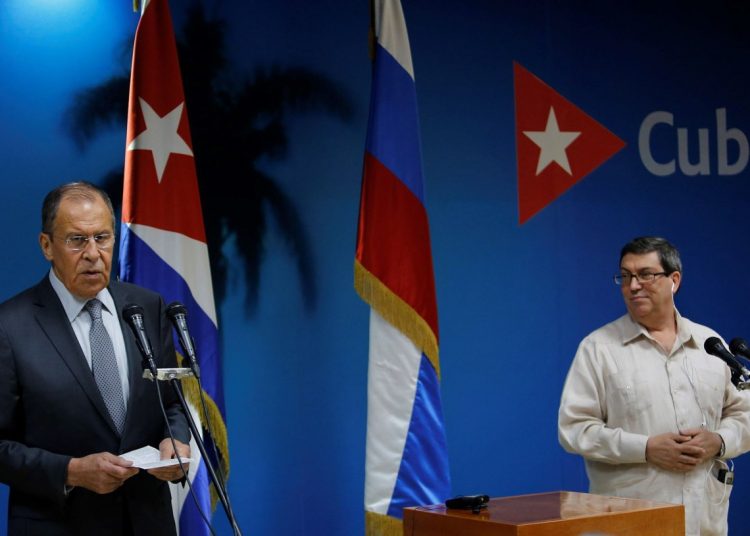Russian Foreign Minister Sergey Lavrov closed ranks in Havana this Wednesday with his Cuban counterpart, Bruno Rodríguez, and promised to strengthen Moscow’s alliance with Cuba and Venezuela against what he considered U.S. “impositions” and “neo-colonial methods.”
Lavrov, who is visiting the island to strengthen political dialogue, address various aspects of bilateral cooperation and evaluate the progress of the agreements signed in November last year between presidents Vladimir Putin and Miguel Díaz-Canel, reiterated twice that “We will continue to support the Cuban people.”
The Russian foreign minister also confirmed the next visit to Cuba by Dmitri Medvedev, prime minister and Putin’s right-hand man, who plans to travel to Havana in October on the occasion of the 500th anniversary of the foundation of the city, to be celebrated in November.
Regarding relations with Cuba, he highlighted the “extensive dialogue in trade and investment” that both countries maintain, which is reflected in projects such as the renewal of the Cuban rail network until 2030 with Russian investment, whose cost is estimated at up to one billion euros (equivalent to about 1.123 million dollars).
https://twitter.com/mae_rusia/status/1154032084723257344?ref_src=twsrc%5Etfw%7Ctwcamp%5Etweetembed%7Ctwterm%5E1154032084723257344&ref_url=https%3A%2F%2Foncubanews.com%2Fmundo%2Frusia-cierra-filas-con-cuba-y-venezuela-frente-a-imposiciones-de-eeuu%2F
Lavrov also outlined Russia’s strategy of “developing ties with Latin America and the Caribbean” and rejected the “impositions of values,” the “appropriation of financial resources” and the “persistent neo-colonial methods” he attributed to the government of U.S. President Donald Trump in his strategies towards the countries of the region.
In addition, he urged European countries and other U.S. allies to curb Trump’s aggressive policies and convince him to recover the spirit of multilateral understanding sown in the middle of last century with the creation of the United Nations and the Bretton Woods agreements.
As expected, Lavrov also condemned the economic and commercial embargo that Washington has imposed on Cuba for more than six decades, recently strengthened by the Trump administration with new sanctions.
As for Venezuela, he reiterated Russia’s position of seeking a solution to the political crisis that the country is experiencing “through peaceful methods, such as the use of diplomacy and the provisions of the UN, without interference from third countries or the use of force.”
In this regard, he pointed out that contacts between the government of Nicolás Maduro and the opposition, led by Juan Guaidó, “must generate dialogue, without imposing conditions” so that “the Venezuelan people can decide their own future.”
For his part, Cuban Foreign Minister Bruno Rodríguez thanked Moscow’s support for Cuba and the Venezuelan government of Nicolás Maduro against U.S. sanctions and affirmed that Russia holds “leadership in the defense and preservation of peace” in the world.
This Wednesday’s meeting in Havana is the second this year between Lavrov and Rodríguez, who last May in Moscow expressed their unity against the “unilateral coercive measures” of the United States against the two countries, especially the strengthening of the U.S. embargo against Cuba.
Also this Wednesday, the Russian foreign minister met with former president and leader of the Communist Party of Cuba Raúl Castro and participated alongside him in the reopening of the Statue of the Republic, in Havana’s Capitol building, seat of the Cuban parliament, in whose restoration Russia has been involved.
El General de Ejército @RaulCastroR, primer secretario del @PartidoPCC, acompañó este martes al ministro de @mfa_russia, Serguéi #Lavrov, en el acto de inauguración de la obra de restauración de la Estatua de la República en el Capitolio Nacional. | #Cuba #Rusia pic.twitter.com/q95WvkW7jp
— Cancillería de Cuba (@CubaMINREX) July 24, 2019
After his visit to Havana, Lavrov will travel to Brazil on Thursday, where he will participate the following day in the meeting of foreign ministers of the BRICS group, formed by Brazil, Russia, India, China and South Africa. In the South American country, he is also scheduled to meet with his Brazilian counterpart Ernesto Araújo.
EFE / OnCuba










